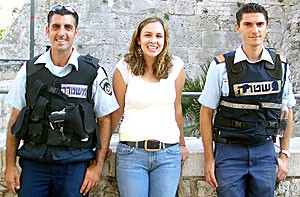It’s a time of celebration in Israel.
In Jerusalem last week, the streets were filled with makeshift tents in which families celebrated the Jewish feast of Sukkot. Concerts and shows drew crowds in every park, and sometimes groups of men broke into dancing in big circles, the strands of curls on their temples (a Jewish custom) bouncing with each step.
Jewish families navigated their baby strollers through the streets on their way to visit friends or worship at the Western Wall. Some women, creatively adhering to the religious requirement to cover their heads, wore toupees – sometimes natural-looking, sometimes ugly, but always a little humorous to me.
In Nazareth, the Muslim Arabs are preparing for Eid Al-Adha, which marks the end of Ramadan, the holy month of fasting. The fireworks that go off nightly are becoming more frequent as the Eid approaches. Parents take four or five days off work, and Christian and government schools alike have Saturday through Wednesday off, especially since Christians are often invited to celebrate the Eid in Muslim homes.
The small grocers along the street are packed with women buying supplies for the feast they will prepare. The sweet shops are the busiest, especially after sundown, when the Muslims can break their daily fast. Families walk through the streets on their way to relatives’ houses. Young men smoke tobacco in water pipes, and old men talk politics on the sidewalk.
Women sit on their porches and discuss potential mates for their daughters and granddaughters. Young women here tend to be sheltered, so they are in their homes after dark, often talking on the phone or instant messaging their boyfriends.
An inevitable part of preparing for these holidays is passport bureaucracy. Israel’s borders have been drawn and redrawn, so Arab families are separated by barbed wire and cement walls. Many families in Nazareth have relatives in the West Bank or Gaza who are not allowed into Israel. Arab Israelis can visit these territories, provided they complete background checks and paperwork at the courthouse.
As an American with an expired 30-day visa, I too found myself waiting in a crowded room of Israel’s interior ministry branch here. Looking around, it was easy to see how the Arab population here is growing so fast. Mothers and fathers carried infants, their toddlers holding onto their shirts and their elementary school-aged children tagging along behind. Crying, shouting, pacifying and commanding drowned out the constant chatter.
During these times of celebration, the recent war and the nation’s tense security situation seem to be in the back of everyone’s minds – but these issues are still there. Minority religious groups complain of increased violence since the Islamic intifada of 2000. Passengers and their bags are checked at the entrances to Jerusalem bus stations, and Muslims are often barred from walking near the Western Wall. Police make hourly rounds through Jerusalem’s Old City.
But a people who are so readily portrayed as grudge-holders and anti-Semites accept these problems with fortitude and even grace.
At another recent celebration I attended, a Lebanese priest talked politics with members of his Israeli Arab congregation. They also planned for their annual Christmas parade – a big event in the city of Jesus’ childhood – over bottles of araq, a Lebanese liquor, with Lebanese soap operas playing loudly on the TV. The revelers integrated Lebanese and Israeli cultures seamlessly and unselfconsciously.
These Arab Israelis have developed a quiet patriotism; they love their country, but their sense of war and peace is not black and white. Because they are Arab, they identify culturally with the Arab countries with which their own nation has warred.
But they are still proud to be Israelis, proud that they can speak Hebrew and Arabic, grateful for the national health care system, and happy that the war is over so they can once more travel to the north to hike, swim and fish on the beach and in the mountains.
As a people in the crosshairs of many overlapping conflicts, Israelis – Jewish and Arab – accept that things won’t always make sense or be perfect. Whether deliberately or not, they carry on their living – their shopping and eating and visiting and traveling and marrying – with content resilience.
Marian Lacy is a senior majoring in Near Eastern Studies, English and molecular and cellular biology. She is spending the semester volunteering in a hospital in Nazareth, Israel and can be reached at letters@wilcat.arizona.edu.









